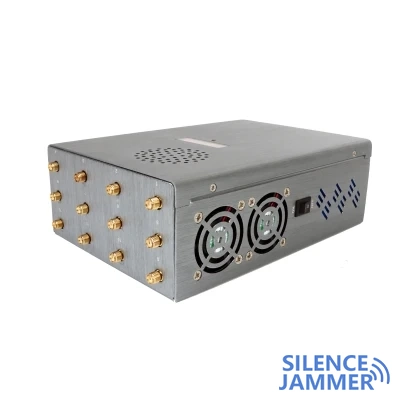As a modern means of transportation, the safety and reliability of communication of airplanes are crucial. Although signal jammers can effectively prevent unnecessary interference with wireless communications in certain situations, the use of such devices on aircraft is rarely seen. This article will delve into the reasons why signal jammers are not installed on aircraft, covering various factors such as safety, laws and regulations, and technology.

How signal jammer works
Signal jammers block radio communications in specific frequency bands by emitting interference signals, making it impossible for the target device to receive or send signals normally. These devices can block various wireless signals including ,mobile phone signals, WiFi signals, and GPS signals are often used in places such as examination rooms, conference rooms, and prisons that require confidentiality and interference prevention.
Potential issues with using signal jammers on aircraft
- Affects airborne communications systems
- Reliability of emergency communications
Aircraft rely on a variety of communication and navigation systems to ensure flight safety. These systems include, but are not limited to, VHF (very high frequency communications), satellite communications, and GPS navigation. Signal jammers may interfere with the normal operation of these critical systems, causing communication interruptions or navigation errors, thus posing a serious threat to flight safety.
During flight, it is crucial to maintain open communications with ground control and other aircraft, especially during emergencies. Signal jammers may block emergency communications between the crew and the ground or other aircraft, delaying the transmission of key instructions and increasing the risk of accidents.
laws and regulations
- international aviation regulations
- Passenger communication needs
International aviation regulations have strict regulations on the use of electronic devices on board aircraft. The International Civil Aviation Organization (ICAO) and various civil aviation administrations (such as the US Federal Aviation Administration FAA and the European Aviation Safety Agency EASA) stipulate that any equipment that may pose a threat to flight safety is prohibited from being used on aircraft. Signal jammers fall into this category and are not allowed to be installed or used on aircraft.
Modern passengers have increasing demands for communication during flights. Although airplane mode has traditionally required wireless communications to be turned off, as technology advances, many airlines have begun to provide in-flight WiFi services, allowing passengers to stay connected with the outside world during the flight. The use of signal jammers would deprive passengers of this need and run counter to the development trend of modern air services.
technical and economic factors
- technical complexity
- alternative technology
Communication systems on aircraft are complex and any new equipment needs to go through rigorous testing and certification procedures. If a signal jammer needs to be installed on an aircraft, it must be ensured that it does not cause interference to existing systems. This will increase technical difficulty and cost and is not economical.
In order to avoid interference from passengers' mobile phone signals to onboard equipment, airlines and aircraft manufacturers have developed a series of technical measures. For example, on-board picocell systems can manage and control passenger wireless communications so they do not interfere with critical aircraft systems. These alternative technologies can meet the communication needs of passengers while ensuring flight safety, and are more effective than signal jammers.
In conclusion
Taking into account various factors such as safety, laws, regulations, technology and economy, signal jammers are not suitable for use on aircraft. Although it can effectively block unnecessary wireless communications on other occasions, on an aircraft, it is obviously more important to ensure the normal operation of the onboard communication system and navigation system and to meet the communication needs of passengers. Airlines and regulators have adopted a variety of technical means to balance these needs and ensure flight safety and service quality. Therefore, it is not necessary or reasonable to install signal jammers on aircraft.


